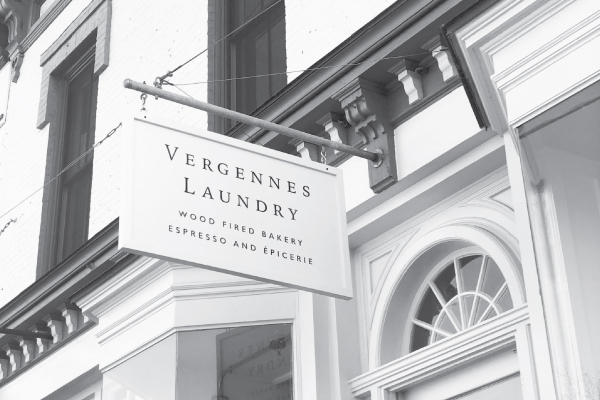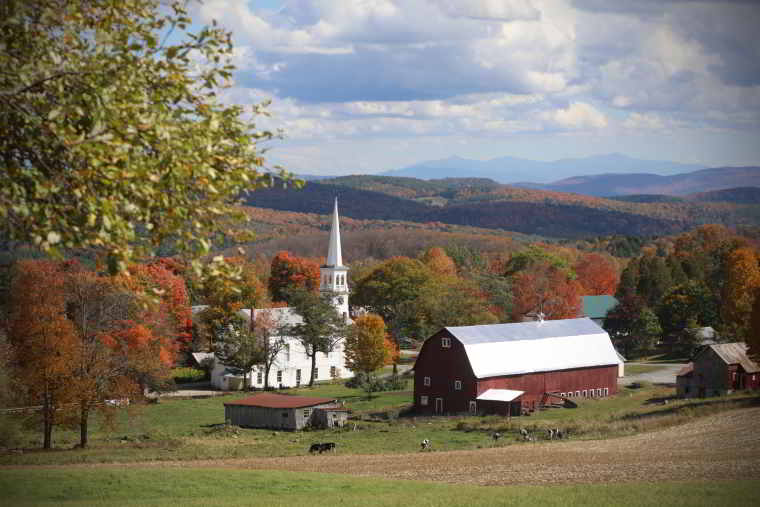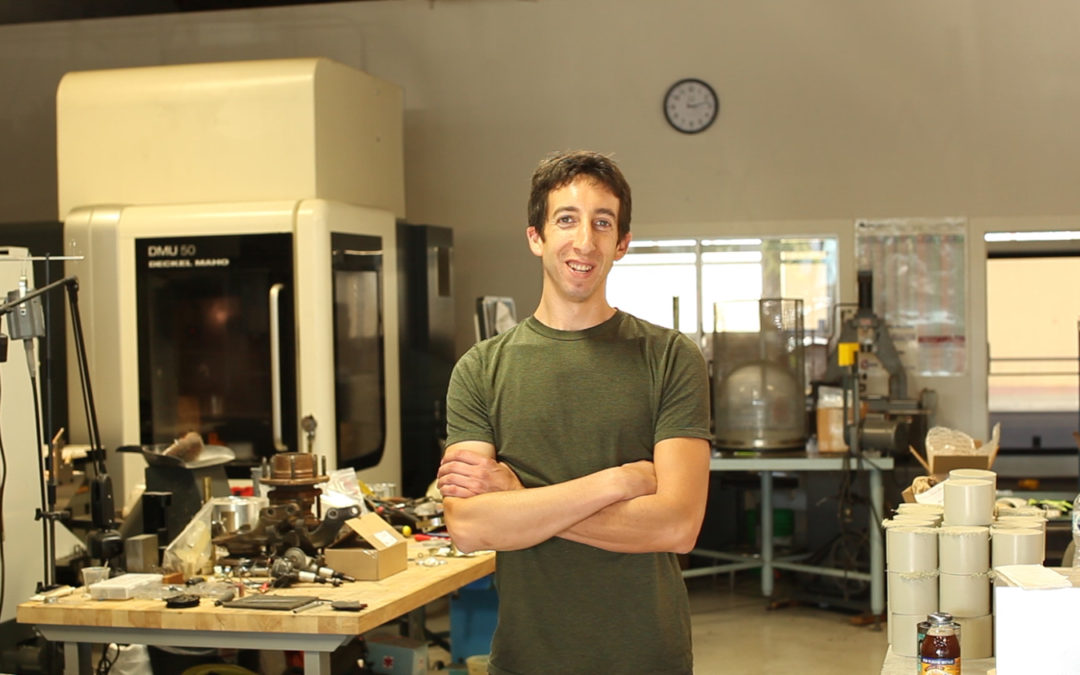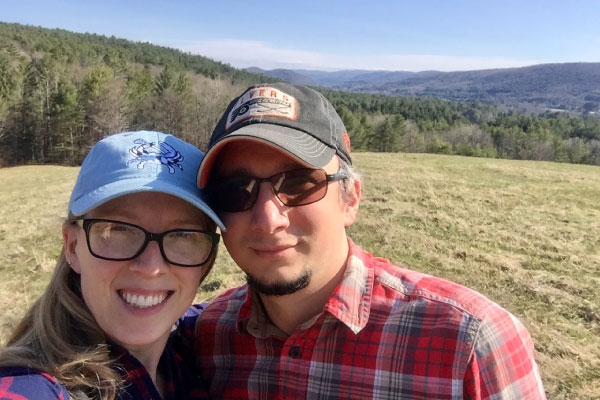
by Kelsey Price | Feb 15, 2021 | Central Vermont, Entrepreneurship, Food & Beverage, Incentives/Financing/Programs
For years, Nadia Dole had stopped at Vergennes Laundry on her way to visit family in Montreal. She loved the simplicity of the French-style café and bakery on Main Street in Vergennes, and even considered purchasing the business when it went up for sale in 2017 by then-owners Julianne and Didier Murat. But she wasn’t quite ready to take the plunge. Three years later, her dream has become a reality.
Last fall Dole purchased the business from Chef Christian Kruse, who had rebranded the restaurant as Vergennes Laundry by CK. As the new owner, Dole has brought back not only the café’s original name, but also the Murat’s minimalist approach. She opened on January 7th with a simple menu of an espresso bar and a small offering of wood-fired pastries and épicerie. Over time she plans to increase her offerings to include a selection of grocery items, wine, and prepared “to go” meals.
Turning a Dream into a Reality
Although Dole originally planned to handle the financing of the project on her own, she realized after Covid-19 hit that she needed support. She reached out to the Vermont Economic Development Authority (VEDA), which in turn referred her to the Vermont Small Business Development Center (VtSBDC) for assistance writing a business plan. Dole didn’t hesitate to reach out. As the former owner of food shops in Massachusetts and Rhode Island, she understood the value of having an experienced advisor at her side during the business startup process.
“I feel very lucky to have worked with Nancy Shuttleworth of VtSBDC,” Dole said. “I absolutely feel like I could have not done it without her. Her knowledge and patience with me helped focus, streamline, and articulate my vision. Her confidence in me was the motivation I needed to believe in what I was going for, and her dedication and guidance helped me secure the loan to make my dream come true.”
Shuttleworth assisted Dole with business planning and budgeting. But perhaps most importantly, she helped Dole define what success would look like. “Her honesty helped me ask myself the right questions that led me forward to attain my goal,” Dole said. “Nancy, as far as I am concerned, was the perfect match and the reason I was able to make this happen. I will forever be grateful.”
Vergennes Laundry is open Wednesday through Sunday, from 8 a.m. to 6 p.m.
Looking for more? Visit VtSBDC.org to explore resources or connect with an advisor.
This story by the Vermont Small Business Development Center originally appeared at https://www.vtsbdc.org/longtime-customer-becomes-new-cafe-owner/. Written by Amanda Kuhnert.

by Kelsey Price | Feb 8, 2021 | Meet Your Neighbors, Northeast Kingdom, Relocation Incentives, Relocation Testimonials, Remote Work
When Claire Polfus made the move to Sheffield in Vermont’s beautiful, remote Northeast Kingdom from rural Maine, she was amazed at how accessible life was there.
“I actually moved from a more rural area so access to amenities is actually easier here in many ways. I like the rural, but not remote feel here,” Polfus said.
She originally wanted to move to Vermont to be closer to friends of hers, but says when she arrived, the greater community was equally welcoming.
“The folks at Do North Coworking were wonderful, as were a group of locals who ride bikes together on Wednesday nights at Kingdom Trails. When I bought my house, my neighbor brought over a basket of goodies from an organization in Sheffield that welcomes new residents,” Polfus said.
She was also surprised by how active people were on Vermont community networking site Front Porch Forum.
Polfus’ remote job was secure when she moved to Vermont; she works for a mapping company and applied for a grant through the Agency of Commerce and Community Development’s Remote Worker Grant Program.
She heard about the grant through friends and was surprised at how well the grant program fit her situation.
“The grant made the move to Vermont an easy sell for both me and my employer. I used the grant to become a member of Do North Coworking, which provided a professional space with high speed internet, and made the transition to remote work smooth and easy. I also used it to acquire the technology I needed for remote work. When I was considering moving, the grant definitely swayed me toward Vermont,” she said.
“It definitely opened opportunities that I would have questioned paying for out of pocket.”
Life in Vermont has been rewarding for Polfus.
“When I was considering moving, I think Vermont fit the parameters of what I wanted in a home best – access to world-class recreation opportunities (particularly cross country skiing and mountain biking), rural landscape, small towns, resilient ecosystems, community support, and local agriculture,” she said.
“I love the trail systems, but I also love that I have immediate access to woods, safe spaces, low traffic roads right when I walk out my door … I like the rural, but not remote feel here. Politically, I appreciate that there is better support from the state government for local communities than where I previously lived. And I LOVE the access to good, fresh, local food year-round … I think there is good community support here. And it is a place you can be physically and mentally healthy.”

by Kelsey Price | Jan 29, 2021 | News, Quality of Life, Relocation, Vermonting
As the nation continues to respond to the COVID-19 pandemic, people are looking to rural areas with wide open spaces, fresh air, and tight-knit communities to call home. According to a recent Gallup Poll, almost half of Americans would prefer to live in rural areas or small towns, if given the choice.
The effects of climate change are also influencing decisions on where people can imagine a safe future. CBS News found a formula for a safe haven – inland enough to escape coastal storms and rising water levels, eastern enough to avoid the potential for wildfires, and northern enough to avoid heat waves. Sounds like the Green Mountain State! A family from Paradise, CA, fleeing the Camp Fire, made the move to Vermont, calling it a “functional, extremely happy, healthy place.”
Vermont’s regions are stepping up their efforts to help potential Vermonters relocate. People interested in exploring Vermont job opportunities, housing, and communities can now connect with Think Vermont representatives to schedule an introductory conversation to talk about calling Vermont home.
These tough times have shown that through thick and thin, Vermont’s communities, landscapes, and economy have what it takes to provide healthy, fulfilling lifestyles. One Portland, OR native made the move to Vermont and is settling in well; his endearing “Flatlander’s Application to Join Vermont” published in Seven Days shows he’s a Vermonter by choice.
The future looks bright from where we stand in the Green Mountains.

by Kelsey Price | Jan 25, 2021 | Brownfields, Central Vermont, Incentives/Financing/Programs, Manufacturing, News, Relocation, VEGI
For a company based in California, an expansion to Vermont was just the right move.
KAD Models and Prototypes, a company founded in California, opened its Randolph arm in 2019, after owner Brian Kippen decided he wanted to return to Vermont after having left in 2003 to open his business in Silicon Valley.
KAD Models clients have included Tesla, Camelbak and Google parent Alphabet.
Randolph proved an attractive place to open a manufacturing company thanks to its proximity to Vermont Tech, which ensured access to a consistent pool of local talent, reported the Valley News when KAD Models and Prototypes opened its Vermont branch.
Despite its status as new kid on the manufacturing block, KAD Models and Prototypes is making a bold name for itself, having remediated contamination on a site in East Randolph for an expansion, according to the Rutland Herald.
KAD Models is participated in the Vermont Department of Environmental Conservation’s Brownfields Reuse and Environmental Liability Limitation Program to clean up the site and put it back to work. It’s a win-win; KAD Models gets financial aid for remediating the property, according to WCAX, as well as limitations on liabilities that may arise from the property’s brownfield status, and the state gets a clean and useful parcel of land.
KAD estimated 15 new jobs would be created in the region once the move is complete. The talent pipeline was a big part of why Brian Kippen chose to relocate his business to Vermont; the talent pool in California is so competitive it’s hard for smaller businesses to attract employees, he told the Valley News.
KAD Models is currently exploring the Vermont Agency of Commerce and Community Development’s Vermont Employee Growth Incentive, which provides cash incentives for targeted growth to businesses that qualify.
Businesses looking to relocate will find an array of resources to help them grow and succeed in Vermont. If you’re thinking about expanding or relocating your business in Vermont, contact Tim Tierney, Director of Business Recruitment and International Trade.

by Kelsey Price | Jan 22, 2021 | Central Vermont, Meet Your Neighbors, Relocation Testimonials, Stay to Stay, Vermonting
For Emily Lewis, 36, and her husband, Todd, 37, life in Vermont is all about the outdoors and forging community connections, and that’s just the way they like it.
Lewis had turned the idea of moving to Vermont over in her mind for almost a decade after spending time in Burlington, and after a 2019 trip to Vermont’s Northeast Kingdom, the couple realized it was time to leave Baltimore, Maryland for greener mountains.
The couple relocated to Randolph, Vermont in January 2020. They say throughout the COVID-19 pandemic, Vermont’s small communities and outdoor opportunities have anchored them to their new home.
“It’s been very difficult adjusting to life in a new place during a pandemic, but I’m grateful for an abundance of small towns to explore and easy access to nature. I’m able to snowshoe right outside my door and cross the street to get to a trail system for hiking and running. We joined the 251 Club to motivate ourselves to visit every city and town in Vermont,” Lewis said.
Before they were able to commit to the move, the Lewises spent about six months looking for jobs. Emily works as a landscape architect, and “my field of landscape architecture is very small and specialized which adds to the difficulty [of finding employment].”
After several months of searching without success, “I decided to spend a month working on a farm in the Northeast Kingdom through WWOOF (Worldwide Opportunities on Organic Farms) to give me the opportunity to start meeting more people in the state.”
Connections turned out to be the key.
“Between that experience, a Stay to Stay event in St. Johnsbury, and making connections through other contacts in the state, I was able to get some real job leads. One of the people I met on that trip sent me the posting for the position I have now! Once I had an offer, my husband was able to narrow down his geographic area and find a position in Randolph, in IT,” she said.
Before they arrived, they stayed with some Vermonters they met through their college alumni association while they interviewed for jobs and looked for housing.
The couple immediately felt welcomed into the Randolph community, Lewis said.
“We quickly found resources in Randolph, such as the Kimball Library and Chandler Center for the Arts and local businesses such as Movement Evolved gym and One Main Tap and Grill. Our first weekend in Vermont we went to One Main to watch the football game and quickly hit it off with one of the bartenders, a fellow Philadelphia sports fan! We both work in Randolph and our coworkers were instrumental in providing community, especially when life shut down just a few months later in March for the pandemic.”
Reflecting on the differences between Vermont life and life back in Baltimore, Lewis emphasized the Green Mountain State’s smaller scale.
“Baltimore is obviously a very urban place whereas there isn’t a single stoplight in Orange County! We have to plan errands more here; a trip up to Montpelier isn’t bad, but it’s an hour to Burlington if we need to get to some larger stores,” Lewis said, but added she can actually access daily necessities faster in Randolph than in the city.
Wide open landscapes are a draw, too.
“We used to live in a row house where we could hear our neighbors through the walls and now we have access to 30 acres of adjacent open land,” Lewis said.
“One of the biggest differences in our lives is that my husband, Todd, went from commuting four-plus hours a day between Baltimore and DC to a two-minute commute less than a mile away.”
The Lewises are excited to welcome their first child this May, and say so far, their experience with Vermont’s midwives and health care system has been “wonderful and very personal.”
“I would definitely recommend” life in Vermont, “particularly for anyone with a passion for the outdoors. Nature is a part of everyday life,” Lewis said, and small-town life means it’s easy to feel the interconnectedness on which Vermonters pride themselves.





